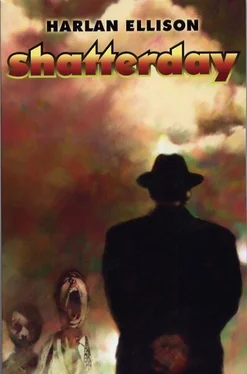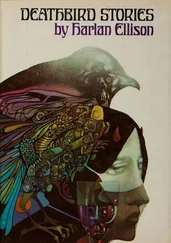I did not finish that story until September of 1978.
It was concluded in four days of sporadic writing while sitting in a plastic tent on the mezzanine of the Hyatt Regency Hotel in Phoenix, Arizona. I was engaged in two mutually contradictory activities at that time. I was the Guest of Honor at the 36th annual World Science Fiction Convention (the IguanaCon) and I was protesting Arizona’s failure to ratify the Equal Rights Amendment. Quite a lot has been written about all that, and it hasn’t much to do with the writing of this story, so I’ll skip over it, leaving to those whose curiosity has been piqued, all the reams of copy about my subversive, fandom-destroying activities in the name of equal rights.
To the point: because I felt that too often Guests of Honor are inaccessible to the mass of attendees at such World Conventions, I arranged for the IguanaCon committee to erect a work-space in full and open view of the entire membership of the Convention. I promised to write a new story, to be taped to the wall for progressive reading as I worked, that would keep me available to the attendees but would also provide a minimal loss of writing time during that long weekend of Guest-of-Honoring.
I concluded “Count the Clock that Tells the Time” on Sunday, September 3, 1978, just a few hours before I won my seventh Hugo award for “Jeffty is Five,” the story that opens this book.
I finished the story, I won another Hugo, I fulfilled my moral and ethical obligations… and I was once again alone. How time flies when you’re enjoying yourself…
When I do count the clock that tells the time,
And see the brave day sunk in hideous night;
When I behold the violet past prime,
And sable curls all silver’d o’er with white,
When lofty trees I see barren of leaves
Which erst from heat did canopy the herd,
And summer’s green all girdled up in sheaves
Borne on the bier with white and bristly beard,
Then of thy beauty do I question make,
That thou among the wastes of time must go…
WILLIAM SHAKESPEARE, the XIIth Sonnet
Waking in we cool and cloudy absolute dead middle of a Saturday afternoon, one day, Ian Ross felt lost and vaguely frightened. Lying there in his bed, he was disoriented; and it took him a moment to remember when it was and where he was. Where he was: in the bed where he had awakened every day of his thirty-five-year-old life. When it was: the Saturday he had resolved to spend doing something. But as he lay there he realized he had come to life in the early hours just after dawn, it had looked as though it would rain, the sky seen through the high French windows, and he had turned over and gone back to sleep. Now the clock-radio on the bedside table told him it was the absolute dead middle of the afternoon; and the world outside his windows was cool and cloudy.
“Where does the time go?” he said.
He was alone, as always: there was no one to hear him or to answer. So he continued lying there, wasting time, feeling vaguely frightened. As though something important were passing him by.
A fly buzzed him, circled, buzzed him again. It had been annoying him for some time. He tried to ignore the intruder and stared off across Loch Tummel to the amazing flesh tones of the October trees, preparing themselves for winter’s disingenuous attentions and the utter absence of tourism. The silver birches were already a blazing gold, the larches and ash trees still blending off from green to rust; in a few weeks the Norway spruces and the other conifers would darken until they seemed mere shadows against the slate sky.
Perthshire was most beautiful at this time of year. He had taken the time to learn to pronounce the names—Schiehallion, Killiecrankie, Pitlochry, Aberfeldy—and had come here to sit. The dream. The one he had always held: silent, close to him, unspoken, in his idle thoughts. The dream of going to Scotland. For what reason he could not say. But this was the place that had always called, and he had come.
For the first time in his life, Ian Ross had done something. Thirty-seven years old, rooted to a tiny apartment in Chicago, virtually friendless, working five days a week at a drafting table in a firm of industrial designers, watching television till sign-off, tidying the two-and-a-half rooms till every picture hung from the walls in perfect true with the junctures of walls and ceiling, entering each checkbook notation in the little ledger with a fine point ink pen, unable to remember what had happened last Thursday that made it different from last Wednesday, seeing himself reflected in the window of the cafeteria slowly eating the $2.95 Christmas Dinner Special, a solitary man, somehow never marking the change of the seasons save to understand only by his skin that it was warmer or colder, never tasting joy because he could never remember having been told what it was, reading books about things and subject matter, topics not people, because he knew so few people and knew none of them, drawing straight lines, feeling deserted but never knowing where to put his hands to relieve that feeling, a transient man, passing down the same streets every day and perceiving only dimly that there were streets beyond those streets, drinking water, and apple juice, and water, replying when he was addressed directly, looking around sometimes when he was addressed to see if it was, in fact, himself to whom the speaker was speaking, buying gray socks and white undershorts, staring out the windows of his apartment at the Chicago snow, staring for hours at the invisible sky, feeling the demon wind off Lake Michigan rattling the window glass in its frame and thinking this year he would re-putty and this year failing to re-putty, combing his hair as he always had, cooking his own meals, alone with the memories of his mother and father who had died within a year of each other and both from cancer, never having been able to speak more than a few awkward sentences to any woman but his mother… Ian Ross had lived his life like the dust that lay in a film across the unseen top of the tall wardrobe cabinet in his bedroom: colorless, unnoticed, inarticulate, neither giving nor taking.
Until one day he had said, “Where does the time go?” And in the months following those words he had come to realize he had not, in any remotely valuable manner, lived his life. He had wasted it. Months after the first words came, unbidden and tremulous, he admitted to himself that he had wasted his life.
He resolved to actualize at least the one dream. To go to Scotland. Perhaps to live. To rent or even buy a crofter’s cottage on the edge of a moor, or overlooking one of the lochs he had dreamed about. He had all the insurance money still put by, he hadn’t touched a cent of it. And there, in that far, chill place in the north he would live… walking the hills with a dog by his side, smoking a pipe that trailed a fragrant pennant of blue-white smoke, hands thrust deep into the pockets of a fleece-lined jacket. He would live there. That was the dream.
So he had taken the vacations he had never taken, all of them at one time, saved up from eleven years at the drafting table, and he flew to London. Not directly to Edinburgh, because he wanted to come upon the dream very slowly, creep up on it so it wouldn’t vanish like a woodland elf hiding its kettle of gold.
And from King’s Cross Station he had taken the 21.30 sleeper to Edinburgh, and he had walked the Royal Mile and gazed in wonder at Edinburgh Castle high on the bluff overlooking that bountiful city, and finally he had rented a car and had driven north out the Queensferry Road, across the bridge that spanned the Firth of Forth, on up the A-90 till he reached Pitlochry. Then a left, a random left, but not so random that he did not know it would come out overlooking the Queen’s View, said to be the most beautiful view in the world, certainly in Scotland, and he had driven the twisting, narrow road till he was deep in the hills of Perth.
Читать дальше












